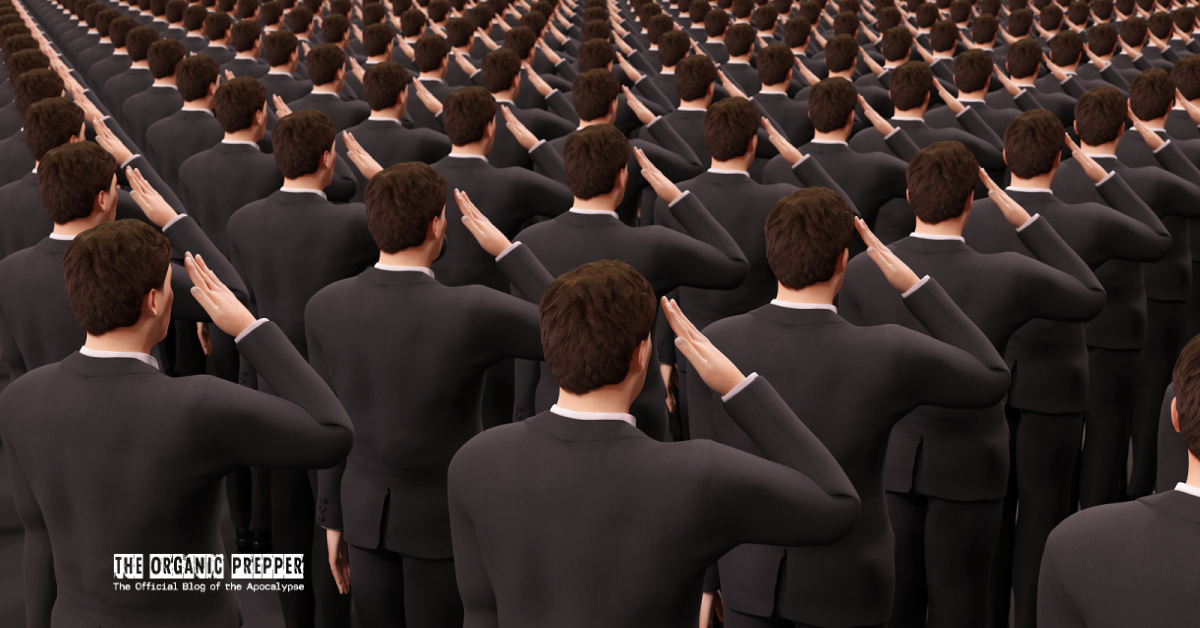(Psst: The FTC wants me to remind you that this website contains affiliate links. That means if you make a purchase from a link you click on, I might receive a small commission. This does not increase the price you’ll pay for that item nor does it decrease the awesomeness of the item. ~ Daisy)
“Fascism should more appropriately be called corporatism because it is a merger of state and corporate power.”
While this was originally written by Italian philosopher Giovanni Gentile, Benito Mussolini took this statement and made it his own
The word “fascism” gets tossed around a lot, but let’s look at the history behind it so we can better understand this political movement. Mussolini used to confidently declare that the 20th century would be the century of fascism. And while he was roundly defeated in World War II, his ideology may have been the winner in the long run.
Fascism was never a well-developed school of thought, in the way Marxism and Leninism were. It emerged as a response to socialism in the aftermath of the First World War.
Mussolini’s fascism
While Italy was technically one of the Allies during World War I, most Italians did not want to fight. Italy still had a far lower standard of living than most of the rest of Europe at this time. Mussolini loved fighting, though, and published opinion pieces in the pro-war newspaper he founded, Il Popolo d’Italia (The People of Italy). As an example of his mindset, you can read his article “Trenchocracy” about the new spiritual elite he believed would emerge as a result of engaging in warfare.
In this 1917 article, he also refers to “an anti-Marxist socialism, a national socialism,” which, as history nerds know, is what Hitler called his political movement, too.
After World War I, when Italy did not get the territory it had been promised, the Italians were humiliated. Mussolini wrote up a manifesto in 1919 that included a mixture of progressive and conservative demands. For example, while Mussolini loved war and soldiers, he hated arms manufacturers and proposed an 85% tax on war profits. He also advocated abolishing the monarchy.
In 1921, however, when Mussolini officially formed his Fascist party, he dropped the progressive demands for a free republic and supported the monarchy.
Why the change?
Well, between 1919 and 1921, the landowning class decided they really liked Mussolini. Wealthy Europeans had watched in horror as Bolshevik revolutionaries in Russia slaughtered the royal family and proceeded to throw Russia into absolute chaos.
Italy had its own share of leftist agitators, too, who absolutely terrified the genteel classes. Mussolini had been a socialist for a while, but he separated himself from them in his glorification of war. Because Mussolini didn’t like socialists and because he enjoyed organizing gangs to fight against anyone he didn’t like, the landowning classes were more than happy to use him to fight against socialist groups. They supplied him with trucks and weapons and let him do their dirty work.
Mussolini’s Fascist party won very few elections. But they were put into power by a wealthy elite that feared communism above everything else.
And once in power, Mussolini worked to make it complete. In 1922 he coined the word “totalitarianism” to describe his idea of a state that encompassed all facets of life. Of course, Mussolini personally failed. But his ideas lived on.
How fascism is different from communism
Communism and fascism are similar in that both states discount the importance of the individual. The cults of personality involved in Communism have made those regimes easily identifiable. Stalin, Mao, Pol Pot, and the Kim family of North Korea: all these men created regimes so obviously horrible that very few people claim to want communism anymore.
But fascism is a little different in that it allows for more independent business functions as long as those businesses support the aims of the ruler. While Mussolini created a cult of personality for himself, it’s not as necessary to the fascist system, especially with our 21st-century mega-corporations. We may not see posters of our leaders all over our walls, but corporate logos are so ubiquitous we don’t even notice them anymore.
And with fascism, corporations can be the arm that wields the whip.
Meanwhile, in America, corporations punish dissenters.
The U.S. and the rest of the Western world like to talk a good game when it comes to democracy, but how truly democratic are our societies? How are dissenters treated? We like to think that the Western world is a beacon of freedom because people like Alex Jones and Joseph Mercola aren’t locked up. But are they treated like equal citizens?
The OP knows personally what happens to truly independent media outlets. We’ve been the victim of downgrading, which affects advertising and how the site earns money. We’ve also been targeted for deliberate defunding.
And we’re hardly alone.
Dr. Mercola was recently debanked, as we wrote about here. He wasn’t being accused of any crimes. His voice is merely inconvenient for the establishment. Law enforcement can’t get him for anything, so they got the corporate powers to punish him.
Some anonymous women have made rape and harassment allegations against Russell Brand. Though he hasn’t been found guilty of anything, his YouTube channel has been demonetized. Once again, even though charges against him have not been verified in a court of law, corporate powers have been used to punish him.
American Express slashed outspoken Trump supporter and MyPillow founder Mike Lindell’s business account by 90% without explanation. Again, Mike Lindell didn’t break any laws. He’s not going to jail, but corporate powers are making his life miserable and affecting his ability to earn a living.
Modern sensibilities make the average citizen laugh at Mussolini’s war-glorifying, marching, shouting, macho persona. However, we are undoubtedly living under a kind of soft fascism, where corporations work with the state to further its agenda. Business still goes on as usual in many sectors, which is why most of us are still living in somewhat comfortable houses and are not starving yet. But we do not have the same kind of government we had 80 years ago.
You might be wondering why this matters.
You may be thinking to yourself, we know who the bad guys are. Who cares what we call them?
Language affects our ability to work together. If we don’t agree on how to identify the enemy, how can we support each other against it? In Genesis, when people get too uppity by building the Tower of Babel, how does God throw a monkey wrench in the project? He makes people unable to understand each other’s languages, which takes away their ability to collaborate.
Language matters.
Do you think the other side doesn’t understand this? Antifa calls itself “antifascist,” while it might very well be the organization most perfectly aligned with Mussolini’s original fascists. They wear black, smash things, and are supported by wealthy interest groups just like Mussolini’s thugs.
Inconvenient history is rewritten.
More importantly, as the press insists on calling Trump a fascist while totally ignoring Antifa, we are living in an age of rewriting history. Just look at what happened in Canada.
When Ukrainian President Zelensky attended a meeting of the Canadian Parliament on September 22, Speaker Anthony Rota introduced Jaroslav Hunka as a war who fought for the First Ukrainian Division “against the Russians.”
Time out. Russia was on the side of the Allies, fighting with the Canadians in World War II.
So, what was Ukrainian Jaroslav Hunka up to during that time?
Turns out that the First Ukrainian Division was also known as the Waffen SS Galicia Division or the SS 14th Waffen Division, a voluntary unit under the command of the Nazi division. The Canadian Parliament gave a standing ovation to a member of the Nazi SS.
The Germans recruited this unit specifically to fight the Soviets. The Germans were well aware of the old hatred between ethnic Ukrainians and Russians and used it to their advantage. While modern sources insist that no one can prove that the Galicia Division participated in the Holocaust, they have been found guilty of war crimes against Poles.
And Galician Jews remember the story a little differently. If you want an eyewitness account of what Jews living in Galicia went through under the Ukrainians, I strongly recommend Alan Levy’s book Nazi Hunter: The Wiesenthal File.
At this point in history, it should be obvious that the Galicia Division was controversial at the very least, and members of that division probably shouldn’t be given a standing ovation and treated as heroes in countries that allegedly prize freedom.
The state-corporate merger is a looming threat.
If we don’t watch our language, if we just support the “current thing,” we run the risk of letting fascism run amok. Canadian Parliament just honored someone who fought for actual, card-carrying fascists.
If you like to read, I strongly recommend reading a history book once in a while, even if it’s only one a year. What you read online is too easy to change and too easy to manipulate. I’ve had my Simon Wiesenthal book for almost twenty years. I got it at a time when we weren’t all pretending that fighting Russians excuses every other atrocity.
Don’t let yourself get dumbed down. Don’t label anyone you dislike a fascist. The state-corporate merger was a specific political movement, one that has only gotten stronger since Mussolini’s humiliating demise. Calling things by their proper names helps us to recognize what we’re up against.
What are your thoughts?
Is this different from your perceived opinion of fascism? What are some other examples of corporations punishing those who go against the status quo? How can we fight something as big as this?
Let’s discuss it in the comments section.
About Marie Hawthorne
A lover of novels and cultivator of superb apple pie recipes, Marie spends her free time writing about the world around her.

















